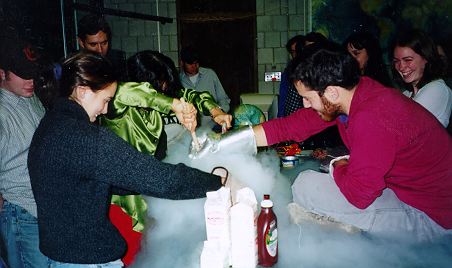|
CHEMISTRY 107
Instructors: This course is intended for students with a strong background in chemistry and mathematics who wish to begin their study of chemistry at a more advanced level. CH107 will cover the material which is rarely covered in high school AP chemistry such as coordination chemistry and chemical bonding and spectroscopy clarified through quantum mechanics. CH107 will emphasize real world research in chemistry. Students will learn new material and review old material through reading and decoding primary research papers. Lab work will parallel the projects in CH104 (synthesis, kinetics, acid-base, redox chemsitry and analysis of unknown inorganic salts), and it will enable CH107 students to review the material they learned in AP chemistry, and enhance their lab skills. (AP Chemistry 4/5 or equivalent and MA113 or equivalent as co-requisite.) 3 hrs. lect., 3 hrs. lab, 1 hr prelab. MEETING TIMES: Lecture : TTh 11:00 AM - 12: 5 PM BIH 530 PreLab Discussion: Th 1:30 PM - 2:20 PM BIH 505 Laboratory : MT 1:30 PM - 4:15 PM BIH 560 OFFICE HOUR: MW 9 AM - 10 AM F 2 - 4 PM. Text:
Any general chemistry book you used at high school. REQUIREMENTS: Daily Assignment and Reflection Paper: Every Tuesday and Thursday night, you are required to write a reflection paper about the subject you have learned that day. You are expected to spend at least one hour for this (Write the starting and ending time on the paper). Every Monday and Wednesday night, you are required to write a reaction paper about the subject you are going to learn the next day. You are expected to spend at least 30 min for this (Write the starting and ending time on the paper). These reflection papers are due the following class. You must hand them to me in the beginning of class as an entry ticket to the class. = 10%
Homework: : : I will assign a H.W. problem set every Thursday, which is
due the following Tuesday in class. = 10% Exams: The exams will cover the lecture material. = 55% (Exam I : 15%, Exam II : 15%, Final : 25%) Laboratory: You must finish all the required experiments to pass this course. = 25% Lecture Topics and Schedule COORDINATION CHEMISTRY 9/14 - 10/28
Reading:
How does cisplatin work?:
Applications: Chelating agents, Bioinorganic Chemistry CHEMICAL BONDING AND SPECTROSCOPY CLARIFIED THROUGH QUANTUM MECHANICS 11/2 - 12/9 11/2, 16, 18: Quantum Theory 11/23, 30, 12/2, 7, 9: Bonding, Spectroscopy
|
